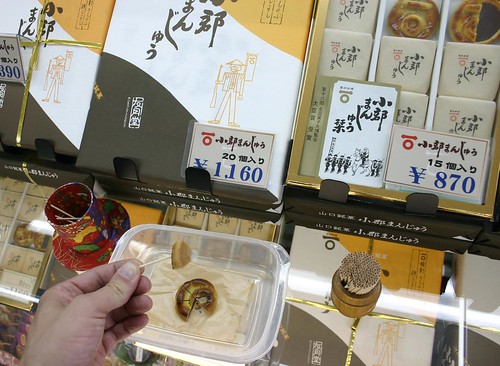Tuesday, November 13, 2012
FAIL Promote obligation rather than put your foot in the door
I realised too late that this experimenta was a FAIL - my fault - since the scale was reversed, with "1" meaning most applicable and 5 meaning least applicable. Hence the Japanese in fact believe that they purchase food after tasting it due to information they receive from tasting the food regarding its taste and freshness. It seems to me that this is not true, but that is what the data proved to be the subjects own perception. The following is therefore incorrect.
Many such souvenir shops and department stores allow the customers to taste the wares, from rice cakes to cured ham and sometimes wine. I think that if shops in the UK were similarly generous then the homeless, hungry and otherwise desiring would eat the proprietors into bankruptcy. But in Japan, the land of "giri" or "obligation," those that taste often feel obliged to buy. Indeed supermarkets often employ ladies to push sausage nibbles upon their customers safe in the knowledge that the latter would feel to obliged to stand their with their mouth open.
This year (2012) one of my seminar students investigated the uniquely Japanese (or at least non-Western) sales technique, to see if providing product samples is merely a tasting (providing information) or a way of improving seller-customer relationships and instilling an obligation (giri) to buy.
Higashiyama (2012) asked subjects (40 university students) to recall a time when they purchased something after having tasted it, and were ask to rate the reason for their purchase according to three categories
1) The needed or obtained information about the product.
2) They felt the shop assistant to be attractive.
3) They felt obligation (giri) towards the shop assistant as a result of being allowed to taste the product.
On a scale of 1 to 5, the results were as shown in the graph below.

Information Obligation Seller Attractiveness
It was found that both shop assistant attractiveness and obligation (giri 義理) were very significantly greater (p less than 0.001) than the importance of having gained information to the purchase decision.
This suggests, as argued by previous research, Japanese emphasise human relationships, especially exchange relationship, over product comparisons. This "sales by promoting obligation technique" is a new sales technique to go alongside "door in the face", and perhaps to replace "foot in the door" which may not work on Japanese because they may be less likely to want to maintain a self-consistently positive self concept.
Bibliography
Higashiyama, S. (2012) Title to be decided. Unpublished graduation thesis, Department of Tourism Policy, Faculty of Economics, Yamaguchi University.
Labels: japan, japanese culture, nihonbunka, 日本文化
This blog represents the opinions of the author, Timothy Takemoto, and not the opinions of his employer.

